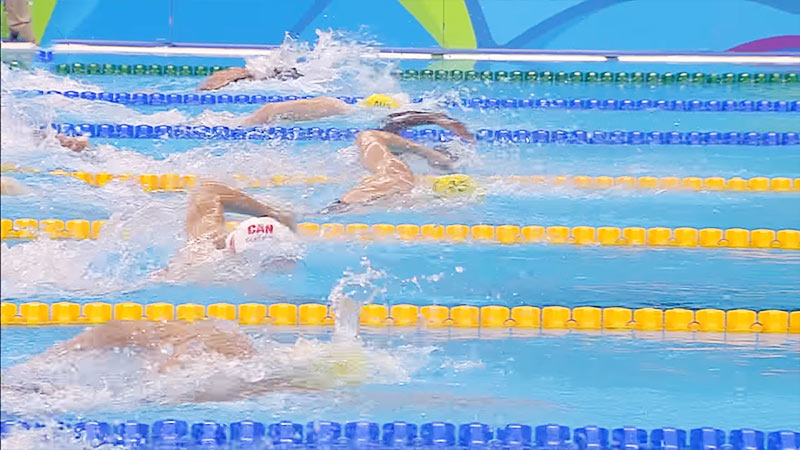The world of competitive swimming has often been seen as a predominantly white domain, with a glaring lack of diversity in its champions. However, beneath the surface, a new tide is rising, and the narrative is evolving.
This blog post delves into the often-overlooked stories of black swimming champions who have defied stereotypes and broken through the barriers of this traditionally exclusive sport.
We will explore the achievements of remarkable athletes like Cullen Jones, Simone Manuel, and Anthony Ervin, who have made history by winning Olympic medals and world records.
Their journeys inspire a new generation of swimmers and challenge the notion that swimming is a sport reserved for a select few.
From groundbreaking successes to the ongoing efforts to promote diversity in swimming, this post highlights the impact and significance of black swimming champions.
Are There Any Black Swimming Champions?
Yes, there are black swimming champions who have not only broken barriers but also achieved remarkable success in the sport. Icons like Simone Manuel have shattered stereotypes and proven that swimming is not limited by race.
Simone Manuel made history by becoming the first African American woman to win an individual Olympic gold medal in swimming at the 2016 Rio Olympics.
Cullen Jones, another black swimmer, held a world record in the 4x100m freestyle relay.
Additionally, Alia Atkinson, a Jamaican swimmer, has set world records in breaststroke events. These athletes have not only excelled in the pool but also inspired a new generation of swimmers, regardless of their ethnicity.
While there is still a need for increased diversity and representation in the sport, these black swimming champions serve as beacons of hope and motivation for aspiring swimmers around the world.
The History of Swimming and Racial Barriers
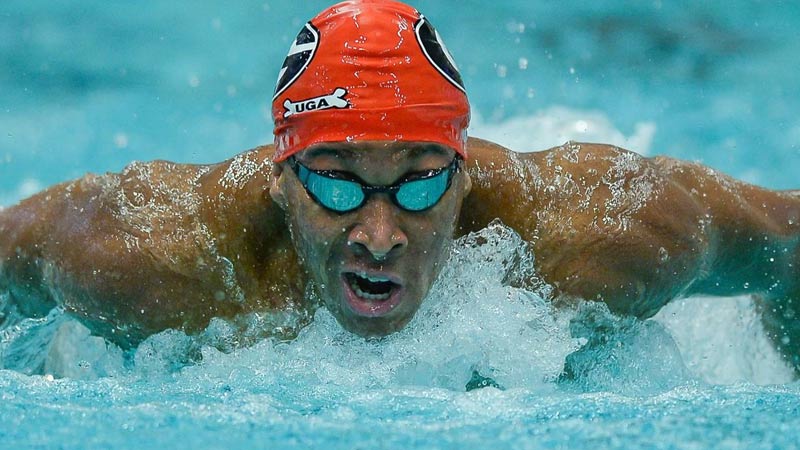
The history of swimming is intertwined with a complex web of racial barriers and discrimination, which have significantly contributed to the underrepresentation of black swimmers in the sport.
Understanding this history is essential in comprehending the challenges that black athletes have faced in the world of competitive swimming.
Segregation in Pools
During the era of racial segregation in the United States, black individuals were often denied access to public swimming pools and facilities used by their white counterparts.
Even when pools were technically open to all, they were often effectively segregated due to the threat of violence and social pressure.
Limited Access to Quality Coaching
Black swimmers frequently had limited access to quality coaching, which is essential for developing elite athletes.
Many coaching opportunities were concentrated in predominantly white communities, making it difficult for black swimmers to receive the same level of training and guidance.
Lack of Competitive Opportunities
Black swimmers had limited competitive opportunities. Many swim clubs and organizations excluded black athletes, limiting their chances to compete at higher levels.
This scarcity of competitive experience hindered the development of black swimmers’ talents.
Lack of Recognition
Historical biases extended to the recognition of black swimmers’ achievements. Even when black swimmers achieved remarkable feats, their accomplishments were often underreported or underappreciated in the media.
Implicit Biases and Stereotypes
Racial biases and stereotypes have also played a role in discouraging black participation in swimming.
Some falsely assumed that black individuals were less buoyant or less capable swimmers, perpetuating the myth that they were inherently disadvantaged in the water.
Swimming Education Disparities
Disparities in swimming education have persisted, with many black children not having access to swimming lessons, contributing to higher rates of drowning incidents within the black community.
Overcoming these historical barriers has been a long and arduous process, with the courageous efforts of pioneering black swimmers and dedicated advocates striving for change.
Prominent figures like Cullen Jones and Simone Manuel, along with various diversity and inclusion initiatives, have worked to challenge these historical norms and pave the way for a more inclusive future in the world of swimming.
Despite the challenges, their success demonstrates that black athletes have the talent and determination to excel in this sport and that swimming should be open to all, regardless of race.
Diversity Initiatives in Swimming
Diversity initiatives in swimming have emerged as a response to historical racial disparities and the underrepresentation of minority athletes in the sport.
These initiatives aim to promote diversity, inclusion, and equal opportunities for all swimmers, regardless of their race or ethnicity.
Here are some key aspects of diversity initiatives in swimming:
Swim for All Campaigns
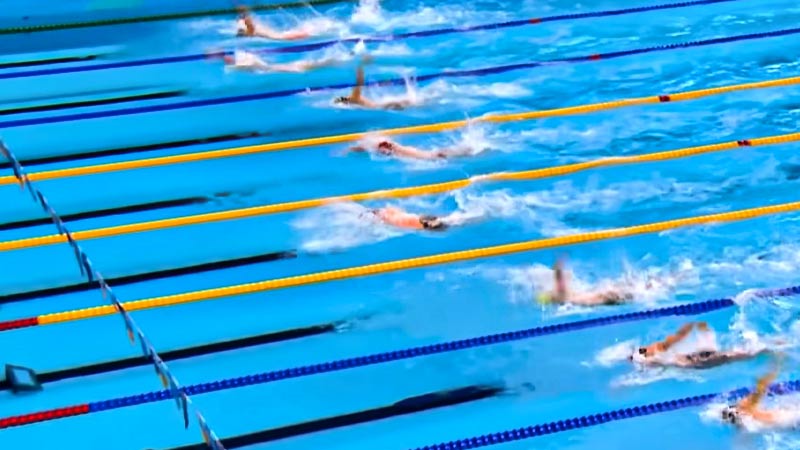
Many organizations and swimming bodies have launched “Swim for All” campaigns, which promote swimming as a sport accessible to everyone.
These campaigns often include public awareness programs, learn-to-swim initiatives, and partnerships with local communities to increase swimming opportunities for underrepresented groups.
Access to Swimming Education
Diversity initiatives focus on providing affordable or free swimming lessons to disadvantaged communities, addressing disparities in swimming education.
The aim is to reduce drowning incidents and encourage more people from underrepresented backgrounds to learn how to swim.
Support for Black Swimming Clubs
Some organizations offer financial support and resources to black swimming clubs, helping them develop talented swimmers and provide access to competitive opportunities.
These clubs can serve as critical hubs for nurturing talent and fostering a sense of belonging within the swimming community.
Scholarship Programs
Scholarships for underrepresented swimmers are available to help talented athletes pursue their swimming dreams, covering the costs of training, travel, and competition fees.
These scholarships create a more level playing field for aspiring swimmers.
Diverse Coaching and Leadership
Promoting diversity within the coaching staff and leadership positions is crucial.
This ensures that swimmers from different backgrounds have role models and mentors who understand their unique experiences and can provide guidance and support.
Inclusive Policies and Rule Changes
Swimming organizations are implementing policies and rule changes that promote diversity and inclusion.
This includes addressing issues such as swim cap regulations to accommodate various hair types and styles, ensuring that no swimmer is disadvantaged by discriminatory policies.
Mentorship Programs
Mentorship programs connect experienced swimmers, coaches, and officials with emerging talent from underrepresented communities.
This guidance and support help aspiring swimmers navigate the competitive world of swimming.
Representation and Visibility
Diverse swimmers are celebrated and featured in media, promotional materials, and events. Their achievements are highlighted to inspire and motivate the next generation of swimmers from all backgrounds.
Educational Workshops
Workshops and seminars on diversity and inclusion are conducted within the swimming community to raise awareness and foster understanding among swimmers, coaches, and officials.
Continual Assessment
Diversity initiatives are often subject to ongoing assessment and adaptation. Organizations and advocates continually assess the effectiveness of these programs, making improvements based on feedback and outcomes.
Diversity initiatives in swimming are making progress toward a more inclusive and equitable sport.
These efforts aim to break down racial barriers, challenge stereotypes, and create a welcoming environment where talent and dedication are the primary determinants of success in the world of competitive swimming.
While there is still work to be done, these initiatives are helping to shape a more diverse and representative future for the sport.
Black Male Olympic Swimmers
The representation of black male Olympic swimmers has historically been limited, but a number of talented and groundbreaking athletes have made significant contributions to the sport.
Here are some notable black male Olympic swimmers:
Cullen Jones
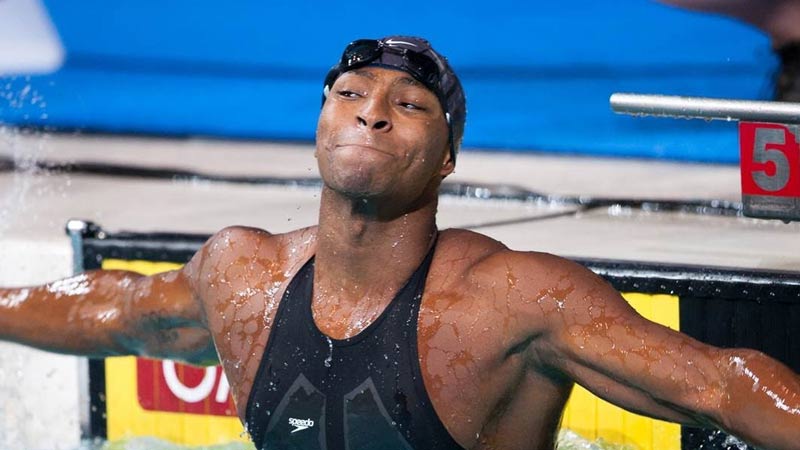
Cullen Jones is a trailblazer in the world of competitive swimming. He became the first African American to hold a world record in swimming as part of the 4x100m freestyle relay team in 2008.
Jones has also won multiple Olympic medals, including gold in the 4x100m freestyle relay at the 2008 Beijing Olympics and silver in the same event at the 2012 London Olympics.
Anthony Ervin
Although Anthony Ervin is known for his eclectic and unconventional career path, he’s made a remarkable impact on swimming.
He won gold in the 50m freestyle at the 2000 Sydney Olympics, becoming the first swimmer of African-American descent to win an individual Olympic gold medal.
He returned to the Olympics in 2016 to win gold in the same event, making him the oldest individual Olympic gold medalist in swimming.
Maritza Correia
While not a male swimmer, Maritza Correia is worth mentioning as a pioneering figure. She became the first woman of African-American descent to make the U.S. Olympic swim team in 2004.
Her success has inspired many aspiring black swimmers, including male athletes, to pursue their dreams in the pool.
Lia Neal
Lia Neal, a female swimmer, deserves mention for her role in diversifying the sport. She became the first black woman to swim in an Olympic final for the United States in 2012, winning a bronze medal as a part of the 4x100m freestyle relay team.
Her success, like Correia’s, has been influential in inspiring young black male swimmers.
While the number of male black swimmers Olympics is not as extensive as it should be, these athletes have shattered stereotypes and made significant strides in the sport.
Their success and visibility have encouraged greater participation and diversity in competitive swimming, serving as role models for future generations of swimmers, regardless of their race or ethnicity.
Significance of Black Olympic Swimmer
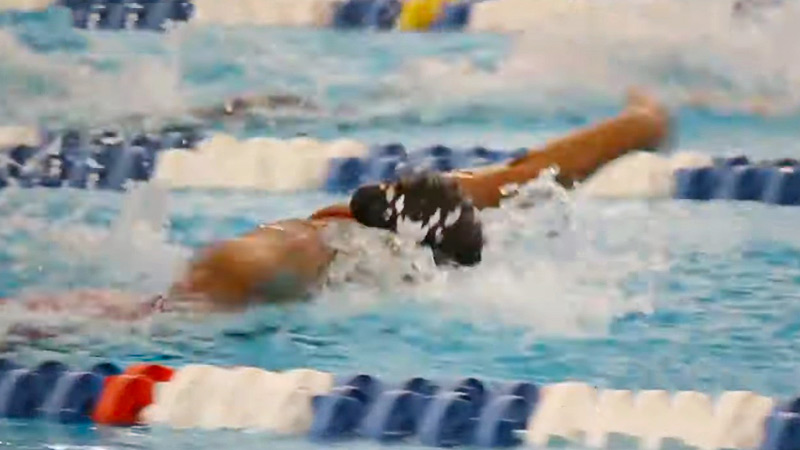
The significance of black Olympic swimmers extends far beyond the confines of the pool. These athletes have made an indelible impact on the world of competitive swimming and have influenced the broader society in several profound ways:
Breaking Racial Barriers
Black Olympic swimmers have shattered racial barriers that have persisted for decades. Their achievements highlight that success in the sport is not limited by one’s ethnicity.
Their presence in the pool has challenged stereotypes and demonstrated that excellence knows no color.
Inspiration for Future Generations
Black Olympic swimmers serve as role models for aspiring swimmers from underrepresented communities.
Their achievements inspire young black athletes to pursue swimming as a viable and attainable career, fostering diversity and inclusivity within the sport.
Promotion of Inclusivity
Their success has led to a more inclusive and welcoming atmosphere in competitive swimming.
It has encouraged swimming organizations to develop diversity initiatives, inclusivity programs, and scholarships aimed at reducing racial disparities in the sport.
Recognition and Visibility
Black Olympic swimmers bring much-needed visibility to the sport. They are celebrated as representatives of their countries and their communities, helping to create a more diverse and representative image of the sport to the world.
Cultural Impact
Their success often transcends the pool and has a cultural impact. Black Olympic swimmers become cultural icons and symbols of achievement, fostering a sense of pride and unity within the black community.
Advocacy for Water Safety
The presence of black Olympic swimmers has been influential in advocating for water safety within the black community.
Their visibility has raised awareness about the importance of learning to swim and the prevention of drowning incidents.
Promotion of International Unity
Black Olympic swimmers are part of a global community of athletes who come together during the Olympic Games.
Their participation fosters international unity and serves as a reminder that the Olympics are a platform for athletes of all backgrounds to compete on an equal stage.
Role in Shaping Policy
The accomplishments of black Olympic swimmers have, at times, played a role in shaping policies and rule changes in the sport.
For example, discussions about inclusivity have led to adjustments in swimwear regulations and caps to accommodate various hair types.
The significance of black Olympic swimmers transcends the sport itself. Their achievements break down racial barriers, inspire future generations, and drive positive change in swimming and society.
These athletes serve as symbols of determination, excellence, and the power to break through historical biases to achieve greatness.
Challenges and Stereotypes for Black Professional Swimmers
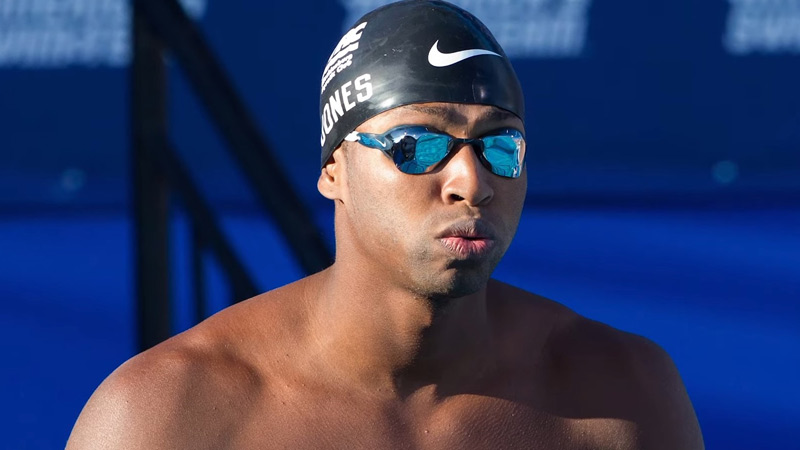
Black professional swimmers face several challenges and stereotypes that have historically impeded their progress in the sport. Overcoming these obstacles has required resilience, determination, and advocacy.
Here are some of the key challenges and stereotypes they have faced:
Underrepresentation
One of the most significant challenges is the underrepresentation of black swimmers in the professional swimming world.
Historically, they have been a minority in the sport, which can lead to feelings of isolation and a lack of relatable role models.
Lack of Access
Access to quality training facilities and coaching is essential for any swimmer’s development.
Many black swimmers have faced barriers to access, including limited opportunities to train with experienced coaches and in well-equipped pools.
Financial Barriers
The cost associated with competitive swimming can be a major obstacle. This includes expenses for training, travel, competition fees, and equipment.
Black swimmers often face financial challenges that can hinder their ability to compete at the professional level.
Racial Stereotypes
Stereotypes about swimming and buoyancy have persisted, falsely suggesting that people of African descent are less capable swimmers. These stereotypes can lead to self-doubt and hinder black swimmers’ confidence.
Lack of Recognition
Even when black swimmers achieve success, their accomplishments have sometimes been underreported or underrecognized in the media. This lack of recognition can contribute to a sense of invisibility in the sport.
Stigma Surrounding Hair
Many black swimmers, particularly women, have faced challenges related to maintaining their hair while swimming. The limited availability of swim caps designed for different hair types has been a longstanding issue.
Microaggressions and Discrimination
Black swimmers have experienced microaggressions and subtle forms of discrimination, which can be emotionally and psychologically taxing.
These may include racial slurs, exclusion, or biased judgments from coaches, peers, or officials.
Cultural Perceptions
Cultural perceptions about swimming as a sport have sometimes discouraged black athletes from pursuing it seriously.
Swimming has been less culturally ingrained in some communities, leading to a lack of awareness and support for young swimmers.
Historical Context
The historical lack of black representation in swimming has perpetuated the idea that it’s not a sport for people of African descent. Overcoming this historical context has been a formidable challenge.
Black professional swimmers have confronted these challenges with resilience and have made significant strides in the sport.
The successes of athletes like Cullen Jones, Anthony Ervin, and Simone Manuel have demonstrated that talent, dedication, and breaking down stereotypes can lead to excellence in the pool.
Their achievements have paved the way for greater inclusion and diversity in professional swimming, inspiring future generations to overcome obstacles and strive for greatness.
FAQs
Are there any black Olympic swimmers winners?
Yes, there have been black Olympic swimmers who have achieved success and won medals, including gold medals.
Prominent examples include Cullen Jones, Anthony Ervin, and Simone Manuel, who have won gold at the Olympics in various swimming events.
Who are the most famous black swimmers?
Some of the most famous black swimmers include Cullen Jones, Anthony Ervin, Simone Manuel, Alia Atkinson, and Lia Neal.
They have made significant contributions to the sport and have broken barriers, inspiring the next generation of swimmers.
Who is the fastest black swimmer?
Cesar Cielo, a Brazilian swimmer, is one of the fastest black swimmers in history. He has held multiple world records and is known for his exceptional speed in sprint events, particularly in the 50m and 100m freestyle and butterfly.
Are there any black swimmers who have won Olympic medals?
Yes, several black swimmers have won Olympic medals. Cullen Jones, Simone Manuel, and Anthony Ervin, for example, have all achieved Olympic gold in various swimming events, breaking barriers and inspiring diversity in the sport.
How have black swimming champions impacted the sport?
Black swimming champions have shattered stereotypes and served as role models, encouraging diversity and inclusivity. Their success challenges biases and motivates aspiring swimmers from all backgrounds.
Wrapping Up
In the world of swimming, the ripples of change are undeniable. The achievements of black swimming champions like Cullen Jones, Simone Manuel, and Anthony Ervin are testaments to their extraordinary talent and determination.
Their stories demonstrate that the pool is a place where excellence knows no color, and the waters of opportunity should be accessible to all.
These athletes have not only shattered stereotypes but have also encouraged diversity and inclusivity in a historically exclusive sport.
As we celebrate their triumphs and recognize their significance, it becomes clear that the legacy of these champions extends beyond the pool.
They are beacons of inspiration, igniting the aspirations of young swimmers, and reminding the world that champions come in all shades, proving that the swim of success is open to anyone willing to take the plunge.

